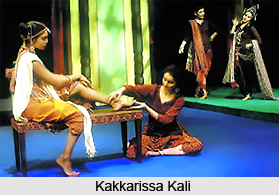 Kakkarissa Kali is also pronounced as `Kakkarichi`, `Kakkarassi`, and `Kakkarasa`. This is a traditional Malayalam theatre form of southern Kerala, which is much like the `Porattu Natakam`. This can be popularly known as nomad`s drama. The Kakkan and his woman Kakkatti belong to a class of nomads who roam the villages. They believe their ancestors were born to Lord Shiva and Parvati who once wandered as gypsies. Their main profession is fortune-telling. The men are also snake charmers and the women experts in stitching. They speak a mixture of Malayalam and Tamil. However, now a day mainly the Nayar community performs Kakkarissa Kali. This art form is almost on the verge of extinction.
Kakkarissa Kali is also pronounced as `Kakkarichi`, `Kakkarassi`, and `Kakkarasa`. This is a traditional Malayalam theatre form of southern Kerala, which is much like the `Porattu Natakam`. This can be popularly known as nomad`s drama. The Kakkan and his woman Kakkatti belong to a class of nomads who roam the villages. They believe their ancestors were born to Lord Shiva and Parvati who once wandered as gypsies. Their main profession is fortune-telling. The men are also snake charmers and the women experts in stitching. They speak a mixture of Malayalam and Tamil. However, now a day mainly the Nayar community performs Kakkarissa Kali. This art form is almost on the verge of extinction.
Kakkan and Kakkatti are the main characters. The experiences of Kakkan, who travels from place to place with his two wives, form the major theme. In the beginning a Komali or jester sings to entertain the audience. Another character, `Kausiki`, enters and renders songs in praise of Shiva and Parvati. When Shiva and Parvati appear, she requests Shiva to save the world from wicked people. Then Kakkan arrives, introducing himself to the audience through song. A stagehand asks him about his wife. He replies that he has two, Kali and Nili, followed by the entry of the two Kakkattis. In one of the stories depicting their experiences, Kakkan gets bitten by a poisonous snake while wandering through the forest, and dies. From the audience, a mendicant steps forward with a knapsack supposed to contain herbs and medicines to cure certain diseases, and offers to bring him back to life provided the Kakkattis give him whatever he demands. They agree, and by administering rare herbs he revives Kakkan. Then he demands that one of the Kakkattis should accept him as her husband, but Kakkan with his wives drives him away.
The Tampuran or landlord, King, minister, and hunter are other characters in these plays. Stories from Hindu epics like Kiratam or `Hunter`s Tale` and Harishchatidra charitam i.e. ` Harishchandra `s Life` are also performed. The actors themselves sing while dancing and delivering dialogues. As in Porattu Natakam, questions are put to them by other characters or stagehands from behind, and answers elicited in the process of enactment. Men perform female roles. The musicians support the cast by singing and playing maddalam or drum and kaimani or cymbals.




















